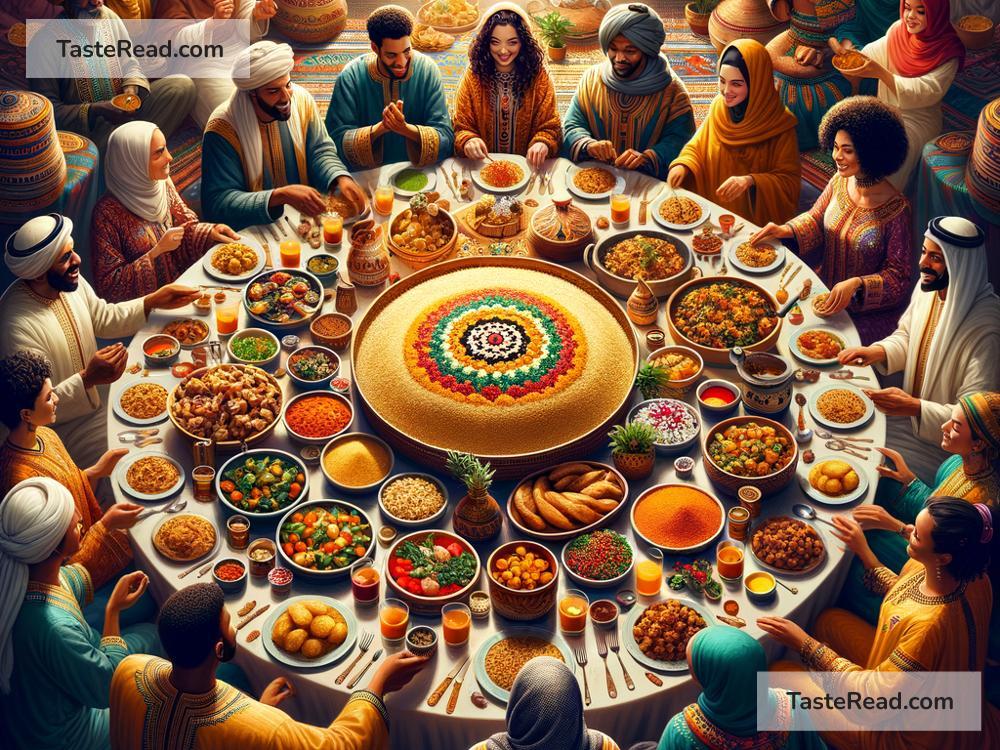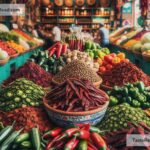The Role of Couscous in North African Celebrations
Couscous is one of the most famous foods in North Africa. This small, round pasta made from semolina wheat is more than just a meal — it is a cultural symbol and a staple in celebrations. In countries like Morocco, Algeria, Tunisia, and Libya, couscous plays a central role in family gatherings, special events, and holidays. It brings people together and carries deep meaning in the traditions of this region.
What Makes Couscous Special?
Couscous isn’t just food; it’s a way of life for many people in North Africa. It is versatile, filling, and can be cooked with a variety of vegetables, meats, and spices. Its simplicity means everyone in the family can enjoy it, but its rich flavors turn it into a dish worthy of celebration.
Preparing couscous requires time and care, making it a labor of love. In traditional homes, cooking couscous isn’t a quick process. It’s often steamed multiple times to make it light and fluffy. Many families believe that taking time to prepare couscous shows respect for the guests and the occasion.
Couscous in Celebrations
One of the reasons couscous is so important in North African celebrations is its ability to feed many people. It is a communal dish, often served in a large platter that everyone shares. Eating together from the same plate symbolizes unity, togetherness, and community.
Weddings
At weddings, couscous is almost always served as the main dish. It is often paired with lamb or chicken and topped with vegetables such as carrots, zucchini, or chickpeas. Some families make couscous even more special by adding raisins, almonds, dried fruits, or spices for a sweet and savory flavor. In Moroccan weddings, for example, couscous is considered a dish of blessings and is served to wish the couple happiness and a prosperous life.
Religious Holidays
North African Muslims celebrate religious holidays like Eid al-Fitr and Eid al-Adha with special meals that include couscous. During Eid al-Adha, many families serve couscous with freshly prepared lamb to honor the occasion. It is a way of celebrating the holiday with loved ones and expressing gratitude for blessings.
During Ramadan, couscous is served after sunset to break the daily fast. It is often part of a festive spread and shared with friends and neighbors. Couscous brings warmth and comfort during this holy month, reminding people of the importance of giving and connecting with others.
Weekly Gatherings
For many families in North Africa, couscous isn’t just reserved for big events. It is also a tradition to serve couscous at weekly gatherings. In Morocco, for example, people make couscous every Friday after Friday prayers. This is a time when families come together to enjoy food, share stories, and connect with one another.
The Friday couscous tradition is passed down through generations, showing how food creates lasting memories and strengthens relationships. Inviting guests to share this important meal is a sign of hospitality and friendship.
Funerals
Even during difficult times, couscous is part of North African traditions. At funerals, couscous is often prepared and shared with the family and community. It represents solidarity and support during mourning, reminding people of the importance of staying united.
Symbolism and Cultural Importance
Couscous is more than just food; it carries cultural and emotional significance. In North Africa, couscous is associated with abundance and generosity. Serving couscous during celebrations is a way of showing hospitality and care for loved ones.
The act of sharing couscous from one large plate reflects the communal values of North African societies. It reminds people to care for one another, to share their blessings, and to enjoy life’s moments together.
Modern Couscous Traditions
Today, while life has become busier, the traditions surrounding couscous remain strong in North Africa. Many families continue to prepare couscous for celebrations, even if they use modern cooking methods. Supermarkets now sell pre-steamed couscous to make cooking easier, but for special occasions, many people still prefer the traditional way.
It’s not just in North Africa that couscous is celebrated. As people from these countries move to different parts of the world, they carry their love for couscous with them. It is now enjoyed in international restaurants and homes around the globe, introducing others to the rich traditions of North Africa.
Conclusion
Couscous is much more than a delicious dish — it is a symbol of unity, culture, and celebration in North Africa. Whether it’s a wedding, holiday, funeral, or weekly family gathering, couscous brings people together to share and connect. Its rich flavors and deep cultural significance make it an essential part of North African life.
Through couscous, people honor their heritage, celebrate their blessings, and strengthen their bonds with loved ones. In every bite, there is a taste of tradition and love that adds joy to life’s most important moments.


